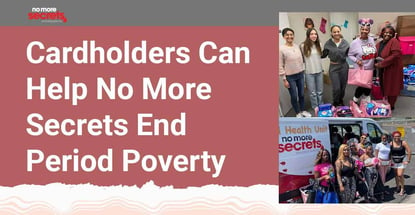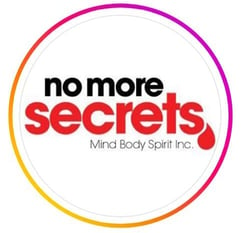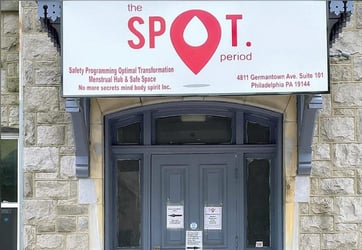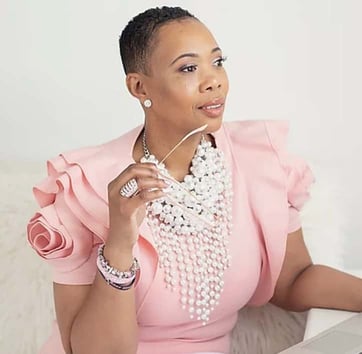
Our experts and industry insiders blog the latest news, studies and current events from inside the credit card industry. Our articles follow strict editorial guidelines.
In a Nutshell: Women lacking access to feminine hygiene products may not know where to seek assistance. No More Secrets is a Philadelphia-based organization that helps women throughout the U.S. access feminine hygiene products and educational resources. The organization’s headquarters welcomes women seeking a safe space. Cardholders can support No More Secrets via financial contributions and by donating much-needed items.
Lynette Medley once served as a counselor, helping young people make safe choices and avoid toxic relationships. In a counseling session one day, a young woman asked Medley how she was supposed to make safe choices when she had to resort to unethical activities to obtain feminine hygiene products.
The young woman wasn’t experiencing homelessness, but her parents couldn’t afford to buy her feminine hygiene products each month. That conversation was the turning point in Medley’s life that compelled her to take action.
Today, Medley is the Founder and CEO of No More Secrets, an organization dedicated to overcoming social stigmas and delivering menstrual health resources and education to underserved communities.

“Period poverty is the inability to access menstrual supply products and safe waste management services,” Medley said. “The U.S. is a progressive country, and many times, people don’t think this is an issue here. But people do lack access to the products they need and running water.”
No More Secrets began in 2012. Medley runs No More Secrets with her daughter, Nya McGlone, who serves as the organization’s Chief Operating Officer.
Medley said the organization started out small when it first opened, focusing on distributing care packages to community members in need. Through conversations with her daughter, Medley said she realized she needed to fight the stigma around periods and let more people know about the work No More Secrets was doing.
Before the pandemic, Medley said No More Secrets delivered approximately 80 care packages per week. Medley said the organization made more than 300 deliveries per week during the height of the pandemic.
“One of the things people don’t realize is that, in addition to the period products we give out, we also provide other services to community members in need,” Medley said. “Many people can’t schedule appointments because they don’t have access to the internet. Some people don’t have access to operable toilets. And those problems grew worse for people during the pandemic because everything shut down.”
Providing a Safe Space for People to Connect
Medley said No More Secrets helps women who lack funds to pay for feminine hygiene products, but it also assists women suffering from medical conditions that can cause them to have ongoing, heavy bleeding. Medley said No More Secrets helps women who have recently given birth and are experiencing bleeding in the days following their baby’s delivery.
“There are people who need help, and often, there aren’t any prescriptions or helpful advice doctors can give them,” Medley said. “We’ve been able to take on that burden. Every socioeconomic group can benefit from access to free feminine hygiene products. We help people so they can live their lives again and go to work, school, and participate in recreational activities.”

Medley said she started raising money during the pandemic to fund a community space for No More Secrets. In February 2021, the organization opened The SPOT Period. SPOT is an acronym for “Safety, Programming, Optimal Transformation.” Medley said The SPOT Period is the nation’s first and only menstrual health and uterine wellness center.
No More Secrets’s headquarters are in Philadelphia. Medley said the organization serves people nationwide by shipping feminine hygiene products to them. No More Secrets has satellite locations, called DOT SPOTS, in Delaware, Maryland, Pennsylvania, and Virginia.
Medley said The SPOT Period is a space where women can gather to talk about their periods in a safe and healthy environment.
“One of the things we’ve come to learn is many of the women we talk to who have bleeding issues aren’t really getting a proper diagnosis,” Medley said. “They may not know how to articulate these issues with their healthcare professionals, or they just aren’t comfortable talking about their periods. We basically use a comprehensive approach to deal with this issue so people can live healthier and avoid issues that can cause problems later on in their lives.”
Educational Outreach Efforts Cast a Wide Net
Medley said The SPOT Period contains a computer center, wifi, and a room where people can relax on futons and watch television. Visitors to The SPOT Period can access feminine hygiene products and educational resources. The SPOT Period also provides guests with operable toilets and running water.
Medley said No More Secrets conducts educational events at schools, community centers, and churches to provide people with information and samples of feminine hygiene products.

No More Secrets operates a Mobile Menstrual Health Clinic from a van that travels to communities in Pennsylvania, Delaware, Maryland, and New Jersey. Medley said the van’s appearance helps start conversations in communities new to No More Secrets.
“The van itself has a big uterus, pads, and tampons all over it,” Medley said. “It makes people feel comfortable to talk with us and helps remove some of the stigma associated with menstrual health.”
Medley said No More Secrets doesn’t receive financial support from city, state, or federal governmental agencies — the organization is funded through community donations. In addition to financial support, No More Secrets accepts donations of requested items. The organization’s website lists items No More Secrets seeks to acquire through donations, such as menstrual pads, tampons, baby wipes, soap, and deodorant.
“The products themselves are very expensive,” Medley explained. “We don’t have a partnership where somebody’s giving us these items at cost. Instead of making financial contributions, many people will support us by buying products we’re in need of and shipping them to us. The financial donations we receive help us pay the rent and cover the costs of supplying products and education to our community.”
No More Secrets Helps Women Reach Their Goals
Medley said she wants to see feminine hygiene products classified as medical devices, allowing insurance companies to help people pay for them. Medley said numerous organizations help people dealing with food insecurity or experiencing homelessness, but people need programs that help them access free or affordable feminine hygiene products.
“There isn’t any oversight as far as pricing goes for feminine hygiene products,” Medley said. “So price gouging can occur, especially in inner cities. Some corner stores charge up to $20 for a pack of pads. Prices are getting higher for everything. People are just trying to pay for their groceries so they eat and be healthy, but no one’s taking into consideration how many pads parents may have to buy for their daughters.”
Medley said she measures No More Secrets’s impact by the number of people it serves and the amount of products it distributes. Since February 2021, No More Secrets has delivered more than 20 million feminine hygiene products to more than 500,000 individuals. Medley said the organization distributes more than 63,000 feminine hygiene products each week, and community members fill the appointments the organization offers as soon as they’re made available.
As Medley looks toward the future, she said one of her goals is to partner with hospitals and clinics to expand the conversation about uterine health and wellness.
“People feel safe to share things with us that they don’t necessarily share with their healthcare provider,” Medley said. “I would love to create more DOT SPOTS throughout the country so that we can all attack this issue in a way that really helps our community.”





![Capital One Pre-Approval: 5 Secrets to Prequalify ([updated_month_year]) Capital One Pre-Approval: 5 Secrets to Prequalify ([updated_month_year])](https://www.cardrates.com/images/uploads/2016/05/capital-one-pre-qualify-1.png?width=158&height=120&fit=crop)
![3 Secrets: Get Frequent Flyer Miles Without Flying – ([updated_month_year]) 3 Secrets: Get Frequent Flyer Miles Without Flying – ([updated_month_year])](https://www.cardrates.com/images/uploads/2017/09/frequent.png?width=158&height=120&fit=crop)


